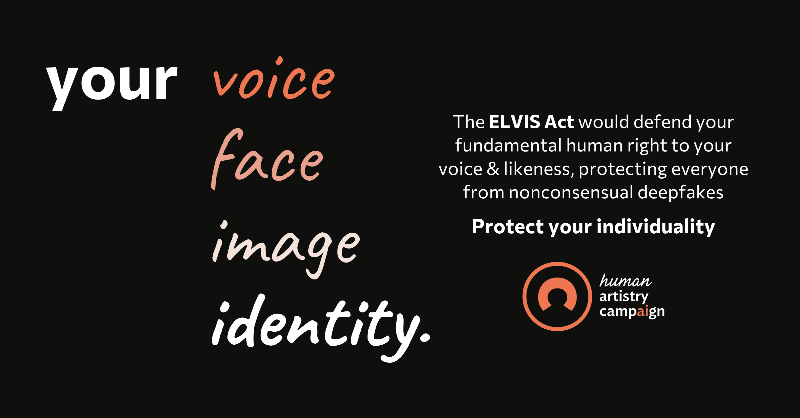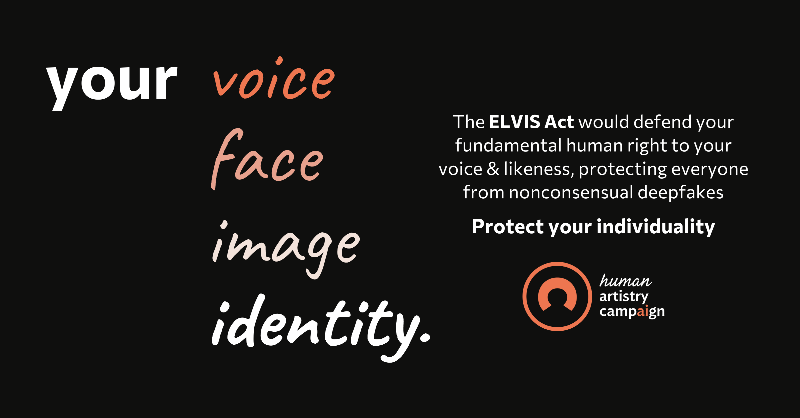In a detailed interview, Todd Dupler, the Chief Officer of Advocacy and Public Policy at the Recording Academy, discusses how the ELVIS Act is designed to tackle the unauthorized use of an individual’s voice, image, and likeness through AI technology.
The Ensuring Likeness Voice and Image Security (ELVIS) Act, aimed at safeguarding individuals’ voices, images, and likenesses from unethical AI exploitation, received unanimous bipartisan approval in Tennessee’s Senate Commerce and Labor Committee and the House Commerce Committee on February 27.

Given Tennessee’s vibrant music industry and its capital’s nickname, “Music City USA,” the swift progression of the bill, introduced by Governor Bill Lee in January, garnered widespread support.
During the committee hearings, influential music industry figures such as Natalie Grant and Matt Maher, both contemporary Christian artist-songwriters, along with David Hodges, a renowned songwriter and co-founder of Evanescence, provided compelling testimonies. Maher emphasized the uniqueness and defining nature of his voice and image in his testimony.
“When others use artists’ voices and likeness without consent, it is a personal and fundamental violation that strikes at the heart of who we are and what we do.”
Todd Dupler, the Chief Advocacy and Public Policy Officer of the Recording Academy, known for organizing the annual Grammy music awards, also attended the hearing.
In a conversation with Dupler regarding the Academy’s efforts through the Human Artistry Campaign and its advocacy in state capitals. They discussed the Academy’s commitment to protecting and advocating for artists’ rights amidst the evolving challenges posed by AI technology.
To use Deepfake (or not)
AI’s rise to prominence has sparked significant debate within the music industry. While certain artists, such as electronic musician Grimes, have embraced and promoted the use of AI, others are deeply concerned about intellectual property infringements and the rapid proliferation of deepfakes.
Dupler noted that among the myriad AI-related challenges facing the creative sector, the concept of AI-generated fakes is perhaps the most straightforward for people to understand.
“A lot of the AI issues are more complicated — more nuanced or legal ambiguity — but this one seems pretty clear that you shouldn’t be able to take somebody’s image, voice or likeness and use it without their permission.”
In the United States, several states have enacted a “right of publicity” law, safeguarding artists from unauthorized commercial use of their image or name. However, many of these laws predate the AI era and fail to address issues related to the digital realm or digital replicas.
Dupler emphasized the necessity to modernize these laws for the digital age. Tennessee, with its robust right of publicity statute—historically utilized by the Elvis Presley estate to safeguard his legacy and name—serves as an ideal starting point for these updates.
“We did name the bill after Elvis, which really would be the first law of its kind that protects image, likeness and voice for artists and specifically in the context of digital replicas and AI.”
The executive from the Recording Academy shared that they collaborated with the governor’s office and key figures in the music industry to develop the legislation and secure the governor’s support. He expressed optimism about the bill’s prospects for passing the full legislature and being enacted into law.
“We take nothing for granted,” he stated, emphasizing the importance of their proactive efforts. “Having cleared these committees, the bill’s next stages are to be presented for a full vote on the floors of the Tennessee House and the Tennessee Senate.”
AI Inspiring Unified Bipartisan Response
Despite its contentious nature, the topic has managed to bring the music industry together.
Dupler acknowledged the challenge of unifying the diverse music community on a single issue. “What we have found is that when we do find that alignment and common ground, we’re able to achieve significant accomplishments for the music community,” he remarked.
He cited the Music Modernization Act of 2018, which updated music licensing laws for the first time in over two decades, and the Save Our Stages Act of 2020, a response to the COVID-19 pandemic that resulted in the most substantial aid package for the arts in U.S. history, as key examples of what can be achieved with unified effort.
“Two consecutive achievements in distinct areas show the music community’s ability to unite and achieve significant goals,” Dupler commented. He expressed optimism that similar unity could be harnessed in the realm of AI, especially in protecting an artist’s likeness, voice, and image.
The collaboration extends beyond the industry, with bipartisan consensus among regulators being notably rare, according to Dupler. This agreement across political divides underscores the widespread recognition of the issue’s importance.
“It’s always really hard to predict what’s going to happen with Congress or with legislation. I don’t know how long it will take for legislation to work its way through the process, but I think they know this is something they need to address.”
Deepfakes have not spared politicians and public figures from their disruptive impact. For instance, in January, scammers employed a deepfake to replicate the voice of U.S. President Joe Biden. This artificial imitation was used in robocalls designed to discourage voters from participating in a local election.
As Elvis once sang — it’s now or never
Without serious consideration or implementation of such legislation, the consequences could extend well beyond impacting individual artists. The ELVIS Act is designed to safeguard not only creatives and public figures but every citizen governed by the law, underscoring the widespread implications of failing to address this issue.
“There is this sense of real personal violation when you see technology able to appropriate your image and voice and do things that you didn’t do.”
Dupler highlighted the case of artist Lainey Wilson, who spoke before Congress about her likeness being used without her consent to market weight loss gummies, despite having no association with the product.
He emphasized, “She’s conscious of her young fanbase, girls who take her words to heart. If her image is misused to endorse a product she doesn’t support, it could significantly mislead her fans and impact their perception and actions.”
However, Dupler also acknowledged the positive potential of AI in the music industry, noting, “The Recording Academy believes AI holds great promise for democratizing music creation, making it more accessible, and possibly introducing new efficiencies or creative concepts in music production that we’ve yet to imagine.”
“However, knowing how fast the technology moves we know we have to set up guardrails really quickly before it moves beyond a point where we can put those protections around it.”
Harvey Mason Jr., the CEO of the Recording Academy, shared a comparable view in a 2023 interview, emphasizing that with appropriate regulations in place, AI could serve as a “creative amplifier” in the music industry.



